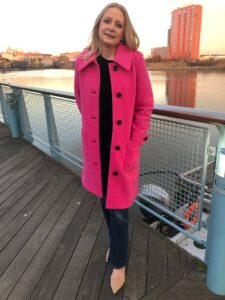As I was getting ready for bed one night, I noticed an area of hardness in my right breast as my arm brushed my right side. It wasn’t a lump, but a solid area, and it immediately caught my attention. My primary care doctor suggested I go get a mammogram – it was going to be my first because I was only 40 years old at the time.
Before I even got the mammogram a few days later, the rigidness was more pronounced and looked almost like an infection of my breast. I didn’t know what it was but the staff at the mammography center clearly recognized it as something that warranted the radiologist’s attention.
My appointment at the mammography center was on the Friday before Memorial Day in 2015. I’m sure the staff at the center were ready to leave for a long, holiday weekend, but they really went above and beyond for me. Before I left that day, the radiologist had outlined an entire plan for me to schedule an MRI, a biopsy and an appointment with a breast surgeon.
Because the radiologist knew what she was looking at, she put all the pieces in place on my behalf. She even called my primary care physician to get her approval on everything she was ordering. She got the ball rolling right away.

I didn’t quite understand it at the time, but everyone’s quick action was intentional.
The follow-up tests confirmed that I had stage III inflammatory breast cancer (IBC). It was confined to my breast and local lymph nodes at the time of diagnosis. I had a 6-year-old son and worked in a corporate role at the time, but much of the next eight months of my life would be devoted to getting treatment for my difficult-to-treat and aggressive breast cancer.
Patients with IBC are often diagnosed with later stages of the disease, in part because IBC presents in a different way – it can look like an infection or a blocked milk duct – and is harder to detect. About 30 percent of patients are initially diagnosed with stage IV, or metastatic disease, which means their breast cancer has already spread to other parts of their body.
In the days between noticing the rigidness on my breast and having a mammogram, the disease had already progressed. My cancer was caught at stage III and still in my breast, for which I feel fortunate. It could have very easily – and quickly – become stage IV and spread to other parts of my body.
I feel fortunate that my oncologist, Dr. Amy Clark, is very active in research and knew how to treat my breast cancer. She was a wonderful fit for me. I’ll never forget during one appointment when Dr. Clark was listening to my breathing and I started to ask her a question, she literally stopped what she was doing to listen to me. She always took the time to talk to me about research that I came across doing my own searching about the disease and answer any questions that I had.
I really felt I could trust her and that she was always acting in my best interest. I knew if she was to recommend something, it was necessary and the very best treatment available.
During the ongoing appointments as a part of my treatment she encouraged me to remain active, happily signing off on 5K training for survivors and LiveStrong at the YMCA. There is a perception that cancer patients need rest, and that is true, but the type of fatigue that results from chemo is one that rest alone may not take away, and Dr. Clark was not shy in vocalizing that I should not spend all my time on the couch!
I think it is exactly what I needed to hear. IBC is tough. Since my diagnosis in 2015, I have had surgery, radiation and HER2-targeted therapy, and now take endocrine therapy since my cancer is triple positive (HER2-positive and estrogen and progesterone-positive). Currently, I feel excellent but remain very vigilant about my health. I maintain my follow-up appointments and bring to my team’s attention any issues of concern. For example, a migraine headache led to a brain MRI last year, as brain metastasis is not uncommon with IBC. Thankfully this was clear.
I have, at times, felt tired and drained through my experience, but with Dr. Clark’s support, and the support of the broader team at Penn, I started learning about and getting involved in complementary therapies. These are things such as yoga, reiki and nutrition, that have helped me build up my mental and emotional health, in addition to my physical health, so I could stay strong during chemotherapy, surgery and radiation. There are many virtual options for complementary therapies during COVID-19, including Be Well Therapy – Yoga for Cancer Recovery (@bewelltherapyinc).
My own experience with IBC has led me to get involved in patient advocacy with various organizations including Unite For Her, which provides complementary therapies to patients (see rondacrary.com as an example), Komen Advocates in Science, Living Beyond Breast Cancer and the Delaware Breast Cancer Coalition. Additionally, I support the team at Penn as a patient advocate to the Translational Breast Cancer Research Consortium (TBCRC) and have completed the National Breast Cancer Coalition (NBCC)’s Project LEAD training for advocates. The ongoing work being done by researchers, like Dr. Clark, is inspiring, and I look forward to continuing to contribute to these efforts.
*We need to know more about IBC to better diagnose it and have effective treatments. We need more understanding of the biology of IBC, we need better clinical data specific to IBC patients, and we need more shared information to improve outcomes for IBC. That’s why Komen, the Inflammatory Breast Cancer (IBC) Research Foundation and the Milburn Foundation® are committed to supporting research to better understand, diagnose, and treat IBC.



